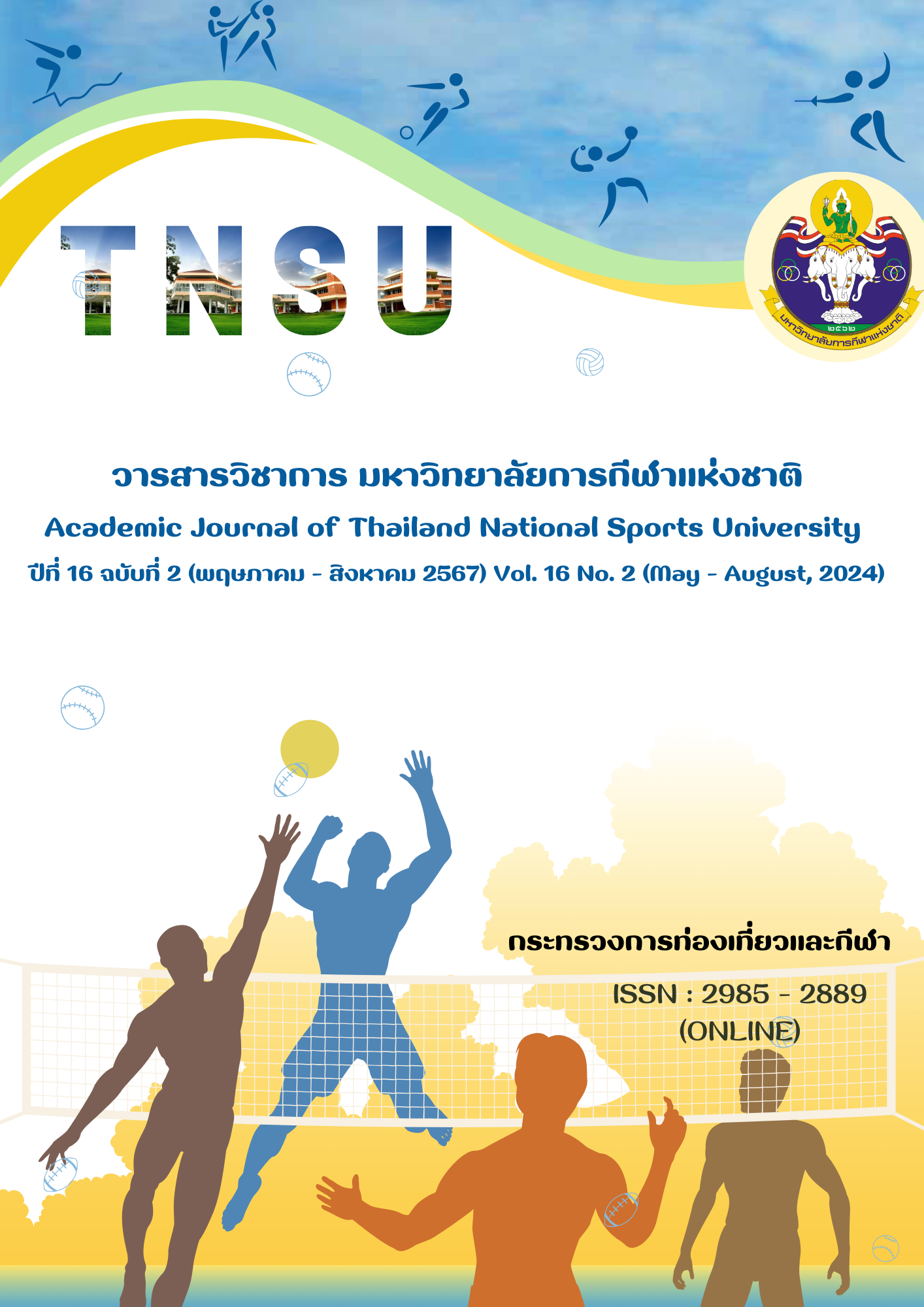DEVELOPING A LEISURE EDUCATION PROGRAM FOR ENHANCING LEISURE SKILLS OF GRADE 9 STUDENTS
Main Article Content
Abstract
This quasi – experimental research aimed to: - 1) develop a leisure education program for enhancing the leisure skills of grade 9 students, and 2) study effects of the leisure education program participation on the leisure skills of grade 9 students. Samples were 367 grade 9 students from Hatyaipittayakom School who were selected from Krejcie & Morgan’s sampling table from 41 schools by simple random sampling (drawing). They were assigned to test the leisure skills evaluation questionnaire in order to match - paired sampling them into experimental and control groups, 30 for each. The research instruments were: - 1) leisure skills evaluation questionnaire- the content validity (IOC) was in the range of 0.60 – 1.00, as well as the Cronbach alpha coefficient correlation reliability was 0.71, and 2) leisure education program for enhancing leisure skills of grade 9 students that was the researcher developed. Data were analyzed by using mean, standard deviation, and t-test. Findings were found that: - 1) the leisure education program for enhancing the leisure skills of grade 9 students included 8 weeks of leisure activities, once a week, and 90 minutes for each. 5 leisure experts approved the face validity of the program. It was at the most appropriate level; and 2) after the experimental group attended the 8-week leisure education program, there were more leisure skills than before attending at the statistic of .05, meanwhile the experimental group had more leisure skills than the control group at .05. It can be concluded that the leisure education program effects on leisure skills of Grade 9 students. It possesses appropriateness to further application.
Article Details

This work is licensed under a Creative Commons Attribution-NonCommercial-NoDerivatives 4.0 International License.
The published article is a copyright of the Academic Journal of Thailand National Sports University. The passage appeared in each article in this academic journal is a perspective of each author which is not related to the journal. Each author is required to be responsible for all components of his/her own article. If there are any mistakes, each author must be responsible for those mistakes on his/her own.
References
Best, J. W. (1970). Research in education. New Jersey: Prentice - Hall.
Caldwell, L. L., Baldwin, C. K., Walls, T., & Smith, E. (2004). Preliminary effects of the leisure education program to promote the healthy use of free time among middle school adolescents. Journal of Leisure Research, 36, 310 - 355.
Dattilo, J. (2008). Leisure education program planning: A systematic approach. Philadelphia: Venture Publishing Inc.
Dattilo, J. (2015). Leisure education program planning. Philadelphia: Venture Publishing Inc.
Digital Economy Promotion Office. (2017). Thai children's behavior survey results vulnerable to 4 types of threats. Retrieved from https://shorturl.asia/zxVTs
Jenkings, H. (2006). The decision process in recreation involvement. Retrieved from www.harappa.education.decision
Kleiber, D. A. Walker, G. J., & Mannell, R. C. (2011). A social psychology of leisure. Philadelphia: Venture Publishing, Inc.
Krejcie, R. V. & Morgan, D. W. (1970). Determining sample size for research activities. Educational and Psychological Measurement, 30, 607 - 610.
Mundy, J. (1998). Leisure education. Illinois: Sagamore Publishing.
National Statistical Office. (2021). The 2021 health behavior of population survey. Retrieved from https://shorturl.at/gpqE8
Papawin Putchaburanasiri. (2009). Effects of using paper fold innovation on leisure skills of grade 4 students (Master’s thesis), Kasetsart University.
The Office of Secondary Education District in Area 16 of Songkha Province. (2019). Basic data of schools in Songkha Province. Retrieved from https://shorturl.asia/ZM9yS
Valmis, E., Bell. J., & Gass, M. (2011). Effects of a college adventure orientation program on student development behavior. Journal of Experiential Education, 34, 127 - 148.
Vaswani, K. D. (2021). Teaching leisure skills to individuals with developmental disability using video promoting. New Jersey: The State University of New Jersey Press.
Williams, D. (2018). The importance of building leisure skills. Retrieved from https://shorturl.asia/Tf9K1


